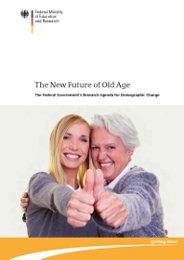Benefiting from the Skills and Experience of the Elderly in Economy and Society
Dedicating one’s own experience, time and vigour to a meaningful activity for as long as possible is satisfying for the individual and represents a valuable resource for society as a whole. Even if reaction time and physical capacity mostly decline with advancing age, possible deficits can be compensated by greater social and professional competence, and a wealth of knowledge and experiences continuously acquired along the educational and occupational biography.
This represents a great opportunity for a knowledge society, which not only depends on the production of knowledge, but also on the classification and evaluation of findings. Committed deployment of experienced manpower can help to counteract potential losses in productivity and a demographically induced decline in GDP. It is also important to activate the employment potential of jobless seniors.
The Federal Government is intensifying its research and development measures aimed at better utilizing the knowledge of seniors and increasing their participation in the labour market, in order to ensure that specific potentials, which often lie idle, can be benefited from even more – whether it is professionally, privately, or in volunteer work. This will help us maintain and even expand the capacity for innovation, competitiveness and progress in a society of longer lives.
Maintaining, promoting and expanding skills
The learning processes of older and younger people differ. The human brain hence requires age-specific stimuli to take up new things, but also to maintain and develop skills for employability. We promote the study of life-long learning and foster the development of age-specific concepts that are aligned with individual needs and skills. This includes the promotion of media skills and the utilization of e-learning systems to allow for customized and sustainable learning processes.
This way we contribute to helping people not only maintain, but also adapt, renew and expand their competences throughout their entire active lifetime on the job, in volunteer work, or on a freelance basis. In this process we also explore how active citizenship that exceeds the professional engagement can be reinforced and designed.
Benefiting from the advantages of mixedage teams
Scientific studies have shown that mixed-age teams can be a competitive success factor. All participants can learn and benefit from one other. The study of efficient collaboration within teams particularly supports smaller and medium-sized businesses in the optimal deployment of their workforce and every single worker in cross-generational teams. In combination with the development of flexible models to further improve health management, this will safeguard the economic efficiency and competitiveness of companies, support their expansion, and lead to greater employee satisfaction. These measures account for diverse training and job biographies, as well as age- and genderspecific competence profiles, and integrate them in a holistic concept. Demographically sensitive personnel management that takes all age groups into account will enable a society of longer lives to maintain its entrepreneurial capacity for innovation, and increase the labour force participation of older people.
More targeted utilization of individual skills
In order to promote existing skills and knowhow in everyday professional life, the Federal Government funds the development of technical assistance systems that particularly support older employees in their tasks. These systems need to be understood as "skill multipliers" that increase the individual physical capability or knowledge potential. We aspire the extension of specific knowledge and skills for the benefit of the individual, and for the economic development of society as a whole.
Rethinking work and personnel recruitment models
We promote age-sensitive and genderdifferentiated personnel policies that support the integration of seniors, in particular of those that are unemployed, and the utilization of their competences in the work process. In cooperation with companies we are also engaged in the development of modern concepts for personnel recruitment, talent management and workflow organization,as well as trend-setting working time models.


